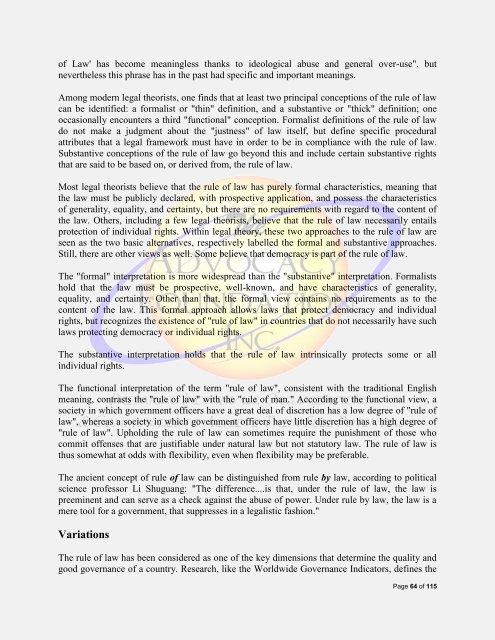Judicial ReEngineering
Judicial ReEngineering
Judicial ReEngineering
You also want an ePaper? Increase the reach of your titles
YUMPU automatically turns print PDFs into web optimized ePapers that Google loves.
of Law' has become meaningless thanks to ideological abuse and general over-use", but<br />
nevertheless this phrase has in the past had specific and important meanings.<br />
Among modern legal theorists, one finds that at least two principal conceptions of the rule of law<br />
can be identified: a formalist or "thin" definition, and a substantive or "thick" definition; one<br />
occasionally encounters a third "functional" conception. Formalist definitions of the rule of law<br />
do not make a judgment about the "justness" of law itself, but define specific procedural<br />
attributes that a legal framework must have in order to be in compliance with the rule of law.<br />
Substantive conceptions of the rule of law go beyond this and include certain substantive rights<br />
that are said to be based on, or derived from, the rule of law.<br />
Most legal theorists believe that the rule of law has purely formal characteristics, meaning that<br />
the law must be publicly declared, with prospective application, and possess the characteristics<br />
of generality, equality, and certainty, but there are no requirements with regard to the content of<br />
the law. Others, including a few legal theorists, believe that the rule of law necessarily entails<br />
protection of individual rights. Within legal theory, these two approaches to the rule of law are<br />
seen as the two basic alternatives, respectively labelled the formal and substantive approaches.<br />
Still, there are other views as well. Some believe that democracy is part of the rule of law.<br />
The "formal" interpretation is more widespread than the "substantive" interpretation. Formalists<br />
hold that the law must be prospective, well-known, and have characteristics of generality,<br />
equality, and certainty. Other than that, the formal view contains no requirements as to the<br />
content of the law. This formal approach allows laws that protect democracy and individual<br />
rights, but recognizes the existence of "rule of law" in countries that do not necessarily have such<br />
laws protecting democracy or individual rights.<br />
The substantive interpretation holds that the rule of law intrinsically protects some or all<br />
individual rights.<br />
The functional interpretation of the term "rule of law", consistent with the traditional English<br />
meaning, contrasts the "rule of law" with the "rule of man." According to the functional view, a<br />
society in which government officers have a great deal of discretion has a low degree of "rule of<br />
law", whereas a society in which government officers have little discretion has a high degree of<br />
"rule of law". Upholding the rule of law can sometimes require the punishment of those who<br />
commit offenses that are justifiable under natural law but not statutory law. The rule of law is<br />
thus somewhat at odds with flexibility, even when flexibility may be preferable.<br />
The ancient concept of rule of law can be distinguished from rule by law, according to political<br />
science professor Li Shuguang: "The difference....is that, under the rule of law, the law is<br />
preeminent and can serve as a check against the abuse of power. Under rule by law, the law is a<br />
mere tool for a government, that suppresses in a legalistic fashion."<br />
Variations<br />
The rule of law has been considered as one of the key dimensions that determine the quality and<br />
good governance of a country. Research, like the Worldwide Governance Indicators, defines the<br />
Page 64 of 115

















